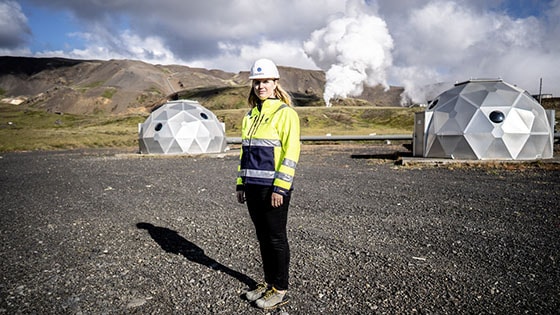| DELIVERING ON DIVERSITY, GENDER EQUALITY, AND INCLUSION
|
|
| In this issue, we look at women leading climate action and why an intersectional approach is necessary to get more women up the career ladder in tech. |
|
|
| ‘Gender equality today for a sustainable tomorrow.’ That’s the theme of International Women’s Day 2022, and the message behind it is simple: the world can’t effectively respond to climate change without the participation and leadership of women, who are bearing the brunt of its effects. |
| One woman working on the cutting edge of climate action: Dr. Edda Sif Pind Aradóttir. Dr. Aradóttir (pictured above at a geothermal power plant) is the CEO of Carbfix, a Reykjavík-based start-up that has developed technology to pump carbon into the Icelandic basalt bedrock, where it turns into stone within just a few years. |
| Carbon capture alone won’t solve the climate crisis—and it’s certainly not carte blanche for emissions—but McKinsey research shows that carbon capture, use, and storage is essential to getting on a 1.5°C pathway and averting the worst effects of climate change. |

|
| Another important part of the puzzle: renewable energy, including solar and wind. Hopping continents, here’s a look at how one of India’s largest renewable-energy companies, ReNew Power, is working to advance gender equality. ReNew is working with the UN and other partners in the state of Gujarat to train 1,000 women salt farmers to become solar-panel and solar-pump technicians. (Pictured above: a woman farming salt in neighboring Rajasthan.) Vaishali Nigam Sinha, ReNew’s chief sustainability officer, says the goal is “to engage women’s interest in an industry that will grow—and enable them to become clean energy leaders in India.”
|
|
| In technical roles across industries (think engineering and product management), for every 100 men who are promoted to manager, only 52 women are promoted. That’s according to the latest Women in the Workplace data on companies in Canada and the US. The figure has serious implications, especially considering that diversifying the tech workforce is key to tackling bias in AI and other technologies. |
| What will it take to get more women into technical roles and up the career ladder? Research by McKinsey and Pivotal Ventures points to the importance of collecting disaggregated data (broken down by gender, race, and ethnicity) at every stage of the pathways into tech. Treating women as a monolithic group means that companies will miss critical insights about the different experiences and challenges that particular communities of women face (the digital divide, for example). Collecting disaggregated data can help companies identify drop-offs in recruitment, promotion, and retention and design interventions that fit the distinct experiences of different groups of women. |
| Transparency and accountability are also key. Companies across industries can help ensure that they make progress toward equity by publishing intersectional data on their employees and leadership. McKinsey analysis shows that while many companies do not publicly disclose their workforce demographics, leading organizations measure a comprehensive set of metrics and share their progress with the public. |
| A recent report by the National Academies of Sciences, Engineering, and Medicine sheds light on why it’s important for employers to take an intersectional approach to advancing gender parity in tech and to be transparent about the makeup of their workforce. In the words of Dr. Valerie Taylor of the Argonne National Laboratory, a coeditor of the report, “The term ‘women’ must reflect the experiences of all women.” The report notes that Black women account for only 3 percent of the tech workforce, Latina women 1 percent, and Indigenous women less than half a percent. |
| Some companies are on the case. Members of the Reboot Representation coalition, for example, collect and share disaggregated data on their diversity and inclusion investments and initiatives. |
| Here’s the latest from McKinsey and the global nonprofit Girls in Tech on how employers can ensure equitable advancement in early-career promotions—particularly that first step up to manager. |
| — Edited by Julia Arnous, an editor in McKinsey’s Boston office |
|
Did you enjoy this newsletter? Forward it to colleagues and friends so they can subscribe too.
Was this issue forwarded to you? Sign up for it and sample our 40+ other free email subscriptions here.
|
|
|
This email contains information about McKinsey’s research, insights, services, or events. By opening our emails or clicking on links, you agree to our use of cookies and web tracking technology. For more information on how we use and protect your information, please review our privacy policy.
|
|
You received this email because you subscribed to the Intersection newsletter.
|
|
Copyright © 2022 | McKinsey & Company, 3 World Trade Center, 175 Greenwich Street, New York, NY 10007
|
|
|
|



